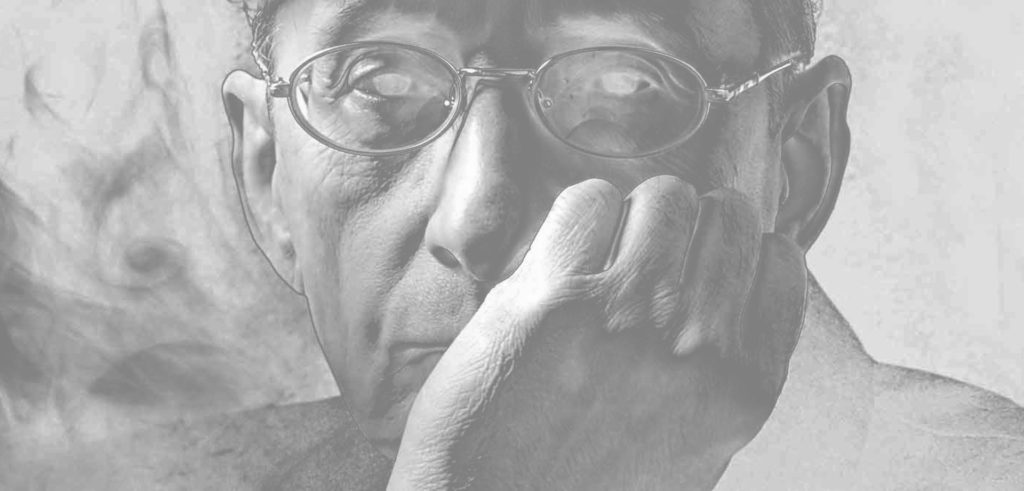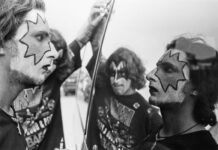“She’s silent. She’s never spoken to me. I hear her speak without her speaking. The dead don’t speak to us when they come in our dreams. They don’t speak to us.
- Did you have a closer relationship with your mother?
That’s what usually happens. The mother is the foundation, the axis around which everything spins.
- That’s why she “visits” you more often…
Yes. She speaks to me without saying a word. It’s the thoughts of the dead that we hear in our dreams.”
~
Manos Eleftheriou, 80 years old, in his last interview
~~~~~~~~~~~~~~~~~~~~~
1966, Cape Town – Johannesburg motorway
Petros, 6 years old, was sitting in the back seat of the silver Mercedes. Nikos, his elder brother, was sitting next to him. They were fighting about a DC comic book.
Father was driving. Irritated by their screams, he lit up a cigarette. Mother noticed. She unfastened her seat belt and turned towards them.
“Could you stop it?”, she said.
“He’s not giving it to me. It’s my turn”, said Petros. “No, it’s not”, replied Nikos. “Yes, it is. You said you’d read a story and then give it to me.” “I haven’t finished yet.” “You have, I saw you.” “Kids… Kids! You are disturbing your father while he is driving.” “He’s not giving it to me.” “I haven’t finished. And you can’t even read.” “STOP IT NOW!”
They stopped. She turned round again. Petros pulled a long face. Nikos scoffed at him.
“Cafri”, said Petros.
Father threw an angry look backwards.
“What was that? I don’t want my sons to say racist…”
He didn’t get a chance to finish the phrase. While he was looking back, the Mercedes got into the right lane.
“GEORGE!” was mother’s last word.
Someone honked and overtook them on the right to avoid the crash. Father turned the wheel abruptly to the left. He lost control. The Mercedes hit the curb and flew into the air. It rolled over three times before coming to a stop after a hundred meters.
~~{}~~
In July 1996 I had already been at Suda naval base for 17 months. I was counting 58 days to my discharge. I was still doing shifts in the kitchen but I had been there for so long that nobody asked me to do anything anymore. Not even shave my hair. I was just waiting for time to pass. Happy days.
The new conscripts had just joined, draft 96D, and the rainbows had been sent over to do the chores. Polakis, being a bit of a sadist, had them clean the baking sheets one by one.
We fed a thousand people per day. There were a lot of dirty baking sheets.
I watched them rub while I sipped my coffee and read Nettlau’s A Short History of Anarchism. I wasn’t being much of a team player, I admit, but that’s how it goes, seniors don’t do chores.
There was a “grandpa” among the new guys. That’s how we called those who did their military service after the age of thirty. He was half bold, wore glasses and had a potbelly. He was the definition of a grandpa.
Surprisingly, he was rubbing the sheets with more zeal than the rest of them, as if he was actually enjoying it.
At some point, he passed by me to go to the toilet. He saw what I was reading.
«Nettlau, huh? You should read Howard Zinn. He’s much more reputable”, granpda told me.
It was not easy to find someone to talk with in the camp. So I told him to leave the baking sheets for a bit and have a coffee with me.
“I’ll help the others finish and then we’ll have a coffee”, he said and briskly went back to work.
I liked his way. I closed the book and joined them. “Let me show you a way to clean them in half the time”, I told them.
Laundry detergent dissolves fats faster. That’s something you learn with experience.
~~
Petros and I took a sit at the restaurant.
“So”, I asked him, “how old are you?” “I’ll turn thirty-six next month.” “Thirty-six! (I was only twenty-two) And why didn’t you enlist earlier? Draft dodger?” “I’ll only do a six-month service. I was studying in Chicago till last year.”
“You were studying at the age of thirty-six? What are you? A heart surgeon or a nuclear scientist?” “The second”, he said.
I was only kidding. It was the first time I had ever met a nuclear scientist – and the last one up to now. To be honest, I didn’t believe him. But later I asked at the armoury and they confirmed.
This is one of the most absurd things in the military or rather in society in general. We find a nuclear scientist and what do we do with him? We have him rub our baking sheets.
He liked manual chores, cleaning toilets, swabbing, repairing stuff. He didn’t want an office job.
He spoke to our seniors about his studies only once. That was after a fifty-year-old warrant officer insulted him. Petros’s response was: “Mister Chatzipanagos. With my intelligence and my degrees, if I was your age, I’d be at least a Vice Admiral in the Greek navy.”
He had his afternoon pass suspended for a few days after this.
~~
I really liked speaking with Petros. He was not just educated, he was cultured. He knew things about music and cinema, he had read a lot of literature, he had lived an intense life.
But we had our most important discussion the night we took the ship to Athens together, Petros just for the weekend and I on pre-discharge leave.
The ship left Suda at eight in the evening and would arrive in Piraeus in the morning. It was a good ship for soldiers. It was big and there were many places to unfold a sleeping bag and get some shut eye.
It was perfect in the summer with all those tourist girls sleeping on the deck.
~~
I had made my supplies for the trip. One kilo and a half of rakia, brought to me by mister Michalis, a civilian in the naval base –God bless him, if he’s still alive. That rakia was more transparent than water. You could drink as much as you wanted without waking up with a hangover the following day.
Petros and I found a place on the deck, I took out the sandwiches I had taken from the kitchen, we opened the rakia and started chatting. We both drank from the bottle. With such a high percentage of alcohol, there was no reason to worry about microbes.
In the beginning, I remember, we were speaking about quantum mechanics. I didn’t understand a single thing. He recommended me some popular science books on the subject, like Alice in Quantumland.
Then I began telling him that every mathematical invention is an illusion – I was getting tipsy. Even 1+1=2 is true by convention. Because it’s only true if we can define 1, the unit. And there is nothing in nature that cannot be divided in smaller parts.
I was talking 22-year-old-I-wanna-be-a-writer bullshit. Petros was laughing.
~~
At some point, after night had fallen, he asked me if I had brought anything else with me. I understood he meant pot. Everybody in the base was smoking it. Even officers. But – unfortunately for Petros – he happened to be with someone who had a different addiction.
We started speaking about substances. I realised that, during his university years in the USA, Petros had tried more drugs than I can name, with a preference for entheogens, psychotropics, psychedelics or hallucinogens.
Payot, psilocybin, magic mushrooms, datura, you name it. He had done them all.
“LSD?”, I asked him.
He smiled but I could see something more on his face, something like sadness, something like nostalgia.
“LSD”, he said, “is something completely different from natural substances. It’s so strong that…” “Like a bomb falling on your head?” “No, nothing of the sort. Heroine is like that. The
acid is different. It’s… Do you remember in the old years – you must have seen it in the movies – do you remember what phone centres used to look like?” “You mean with the switchboards and the phone operators that connected you to whoever you wanted?” “Yea, exactly. But without the phone operators.”
He stopped talking for a bit and I stopped listening. A half-naked tourist girl passed us by. Even a philosopher would fall into temptation at her sight. We had a sip of rakia to come round.
We must have been in the middle of the Aegean Sea at that moment. We could see the moon up in the sky and down on the surface of the sea. We’d rather be flirting with a half-naked tourist. But the company of a friend is the second best thing.
“Imagine”, Petros said when we managed to get our shit together, “a huge phone centre. That’s what the brain is. LSD plugs your perception into a different socket every time. The problem is you cannot control which one.” “And?” “And what? What do you mean?” “Which socket did you get?”
Petros looked at me like trying to decide in a matter of seconds whether he could trust me or not. He must have realised I was crazy enough to believe him.
“The things I have felt, the things I have perceived with LSD, I wouldn’t have perceived if I were to study for fifty more years”, he said. “The brain is a vast place and the strangest thing of all is that even the brain, in its vastness, is limited. There is much more than we perceive and no end to what we cannot perceive.”
He paused, drank some more rakia – the truth serum – and told me a strange, metaphysical experience he had had with LSD.
~~
Petros grew up in South Africa. His father was a diplomat and he was posted in Cape Town. When he was six years old, they had a car accident. His mother got killed; she was not wearing her seat belt. He was seriously injured but they put a metal plate in his head and he survived.
His brother was the eldest of the two, and since that day, he thought he had to protect of him.
One day, when he was living in Chicago, Petros took LSD. Back then, Nikos was studying business administration in London.
LSD gave Petros a bad trip. He roamed the streets like a madman. He was running to get away from the hawk.
Because there was a hawk just above his head. It wasn’t flying; it was just there, a few meters above him. Every time he looked up to see it, it moved a bit backwards.
In his mind, he kept hearing his brother’s voice: “Watch out, Petros. Watch out!”
He quarreled with some people on the street, almost got arrested by the police, he drank juices and vitamin C to come round, but nothing came out of it.
Two hours later he quit. He went to a phone booth and called London. When his call was answered he said: “What do you want? What do you want? I hear your voice in my head. What do you want?”
Across the Atlantic, Nikos started to cry. He told Petros he had had a nightmare. He had dreamt that they were in the Mercedes again, they were fighting about the comic book, and Petros had died in the crash too.
He had woken up in the dark saying: “Watch out, Petros. Watch out!”
But how did he know the exact words he had been hearing?
Petros understood. The hawk above his head was his brother trying to protect him. Thanks to LSD, he had made a connection that was impossible to explain in scientific terms.
~~
He stopped speaking and waited for my reaction. I could have laughed or – even worse – I could have said: “Bullshit. That’s just not possible.”
Bullshit. That’s just not possible. This is the favourite phrase of those who think the universe works in a way we can understand – a way WE can understand.
This is the most egocentric, the most anthropocentric view you can get. Thinking that only what we can understand is possible. Thinking that only what has happened already can happen again, only this and nothing more.
“All the crows I’ve seen are black. Does that mean there cannot be a white crow?” It was Bertrand Russell who made this question.
In the words of Wittgenstein: “The sun rises every morning. But who knows if it will rise tomorrow? It is just a hypothesis.”
~~
I had no reason not to believe Petros’s story. He believed it and he was not someone you could easily mistrust. He had taken a lot of psychotropics – I give you this – but he was a nuclear scientist. And that’s not easy to do. You have to have a strong mind.
Anyway, what he told me afterwards was a lot more difficult to understand, let alone believe.
First he spoke about some private clinics in the USA that treat terminally ill patients with LSD. It helps them get over the fear of their imminent death.
“Because it numbs them or because they get lost in the clouds?” I asked. “No, it’s actually the opposite. LSD does not limit perception, it expands it.” “Sure, that’s what they say.” “Don’t be a moron. At least, I’ve tried it and I know what I’m talking about. What’s your argument against it?”
I had nothing to say apart from clichés. But what he had said about death was difficult to accept. Maybe because it was my biggest fear: death, the annihilation of the self.
Petros said he understood. That’s how he had been feeling too until he had the last meeting.
Following Timothy Leary’s teachings, he created an isolated room in his flat. He kept all lights off and noise to the minimum. And took LSD non-stop. His aim was to remember his mother.
“I had no memory of my mother”, he said. “My memories started from the moment I woke up in the hospital with a metal plate in my head and my father looking at me with eyes full of despair. Everything before the accident had been erased. I couldn’t remember her face, her laughter, the sound of her voice. I only had some photos but they were not enough. I missed her and wanted to see her again.”
Timothy Leary had claimed that the subjects of his isolated room experiments were able to remember incidents from their toddler years or even from their infancy – with precision. All those incidents, Leary said, were stored in the brain’s lost files. LSD, like another type of hypnosis, yet a more powerful one, brought everything to the surface.
Petros paused for a bit. He hadn’t been drinking for some time. He just smoked, spoke and looked at the moon.
“So?” I brought him back to the ship. “Did you make it? Did you remember her?” “What happened was much more important than that.”
~~
He continued to take LSD, eat soup straight out of the can, sleep and wake up in the dark. At some point – it must have been 24 or 48 hours later, he didn’t know exactly – he saw something.
It was not something fluid or foggy the way dreams are. He was actually there.
The silver Mercedes was in front of him, upside down. He could only hear his brother crying. He went towards the car.
He saw his body. Six-year-old Petros was in the back seat. Blood flowing out of his head. Unconscious. Next to him, Nikos had a broken arm but he was awake.
Their father in the front didn’t seem to be injured but he had lost his senses. He was wearing his seat belt, as they did too. But their mother’s body had broken the windscreen and sprung outside. It lay a few metres away in tatters.
Petros tried to go close to her. Then he heard her voice, the voice he thought he had forgotten.
“Don’t go. I don’t want you to see me like that.”
He turned his head and saw her. She was standing there, next to him, young and beautiful. But she was very tall. He understood he was six years old again.
“Mum, I’m sorry.” “My love, it was not your fault.” “I miss you”, he told her. “Don’t worry. I’ll always be by your side. You will go back. I’ll stay here. But I’ll always be a piece of you.”
You will go back. Petros had not created a new image. What he was experiencing was a memory of what had happened.
“Am I dead?” he asked his mother. “You’re in between. But you will go back and you will live a long life.” “Are you dead? How? I feel both like I am here and like I’m not. Like I can see myself many years later. And I’m a grown-up in a foreign city.”
She sighed and smiled.
“It’s impossible to explain”, she told him. “What is happening now will not stay in your memory. You will not remember what we said either”. “I don’t want to forget.” “It’s the only way. You will go back to your body and you will live for many years to come”. “And then?” “Then, time will be of no importance.” “I don’t understand.” “You cannot understand because you’re still here.” “And then?” “I told you. There is no now and then, no before and after. But you will only understand that after you leave.”
She stopped speaking but Petros felt he could hear her thoughts: What we understand when we live in our bodies is what our bodies can understand. This is how far our perception goes. But… It is so difficult and so easy at the same time… It is so different… Something that cannot be explained with words. Just remember that you are looking at the world through a hole. There is a lot more than what you see.
He heard the siren of an ambulance. The paramedics went to the dead woman first. Petros and his mother were looking at them.
“Aren’t you sad?” he said. “When you are here, you will understand”, she replied. “There is no sadness?” “I cannot explain it to you. Words are not enough to describe”.
The paramedics left the woman and went to the car. They got the children out first; Nikos who was crying and asking for his mum, then Petros. They lifted him carefully, gave him oxygen and wrapped a bandage around his head.
“You’re going to go back now”, she told him. “I’m scared”, said Petros.
She bent down and looked me in the eye. “Don’t be scared of anything”, she said. “Enjoy it while it lasts. It’s a present. And tell Nikos and your father …”
He felt he was fainting. He first woke up in the ambulance with the paramedics over his head, then in his dark room in Chicago twenty years later. In between the two, sometime between 1966 and 1986, between the six and the twenty-six year old, between life and the otherworld, he heard his mother’s voice say: “Only love is never lost”.
~~
Since that day, Petros didn’t take LSD again. He didn’t need it anymore. He got the message and hang up the phone.
He told his father and brother everything. It took Nikos some time to accept it. But, surprisingly, when his father heard the story, he didn’t seem in the least surprised or bewildered.
“I often see her in my dreams”, he told Petros. “She doesn’t speak but I know what she’s thinking”.
~~
“And you?” I asked Petros. “Do you ever see her in your dreams?” “Just once”, he said. “I was awake, sitting on the balcony with a glass of wine. I saw a woman in a red dress passing by. I think it was her but she had vanished before I got on my feet”. “Do you miss her?” “Sure. All the time. But I remember what she said”.
Petros made a step back, smiled and looked at me as if it was the first time.
“It’s funny”, he said. “Very few people know what I’ve just told you. My father, my brother, my ex and Georgia… My ex didn’t believe me”. “That’s fine. Some stories are to be shared with just a few. Don’t throw your pearls before the pigs.” “You’re too weird for your age”, he said. “Some of us are born this way”.
~~
We drank the rakia that was left in the bottle and slept like the dead. A few hours later, at Pireaus, we exchanged phone numbers and addresses and went our separate ways.
I never saw him again. I went back to the naval base just to take the discharge certificate and go away again. Petros was on home-leave.
~~
The strangest thing about this story is that Petros (albeit with a different name) is a real person – and he is the only nuclear scientist I know.
I don’t know if the story he shared with me is true, there is no way to tell. But “Petros” thought it was true when he shared it. And I believe him despite the lack of proof.
There is one last thing that I find strange: I began writing this story on July 20, 2018. I finished the first draft on the following evening. On the 22nd, I set out to edit it and find a photo. It was the day that the great Manos Eleftheriou passed away.
I came across one of his last interviews and read what he had said about his dead mother.
Accidentally… Everything seems accidental when you’re looking at the world through a hole.
~~~~
Translated by Anastasia Seni









